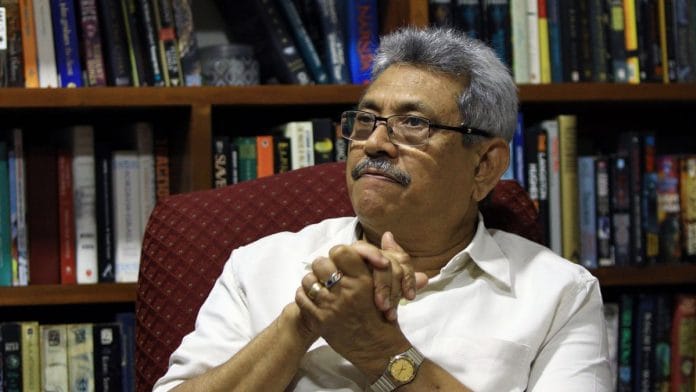Colombo/New Delhi: Gotabhaya Rajapaksa won Sri Lanka’s bitterly contested presidential poll, bringing with him a family of strongmen that could shift the island nation back toward China and reignite racial tensions that have divided the country for decades.
Rajapaksa, 70, won 52.3% of the vote, while the ruling alliance candidate Sajith Premadasa trailed with 42% at the final count, according to state-run television station Rupavahini. He is due to take the oath of office Monday where he will face a parliament led by rival and current Prime Minister Ranil Wickremesinghe, potentially setting off another constitutional standoff that may not be resolved until parliamentary elections due after February 2020.
There are fears a Rajapaksa victory could threaten the country’s fragile democratic progress and see a return to the old authoritarian ways. Gotabhaya was defense minister during his brother Mahinda Rajapaksa’s 10-year-rule, when Tamil politicians were murdered, thousands of Sri Lankans were forcibly disappeared and dozens of journalists were killed or forced into exile.
Faced with a choice between the man with a reputation for getting things done at any cost and an incumbent government that’s drifted through the last four years with little to show for it, voters took a chance on Rajapaksa. He will inherit an economy in which growth has slowed to a more than five-year low of 1.6% in the quarter through June and a debt level hovering at 83% of gross domestic product.
“Gotabhaya’s economic strategy is likely to focus on more populist measures,” as he prepares for parliamentary elections due early next year, said Akhil Bery, South Asia analyst at risk consultancy Eurasia Group. “We’re also likely to see a much friendlier posture toward China, but not as antagonistic to the West as some might believe,” Bery said. “Gotabhaya is pragmatic and likely to recognize that he will need the U.S. support if Sri Lanka’s debt troubles resurface.”
Government Divided
Wickremesinghe, who leads the United National Party and the ruling coalition, made a brief statement now that his rivals have won the presidency.
“We who value democracy will discuss with the speaker, party leaders and members of parliament of the government about the next general election and come to a decision,” Wickremesinghe said Sunday evening.
Wickremesinghe has little room to maneuver — he could attempt to stay on as prime minister until parliamentary elections, step down and pave the way for the former president, Mahinda Rajapaksa, to take over, agree to an early election or form an interim government with the Rajapaksas.
A veteran politician, Wickremesinghe proved tough to dislodge during last year’s constitutional crisis.
Still, Eurasia Group’s Bery said there may be an attempt to replace him. His government is already teetering — Premadasa, along with Finance Minister Mangala Samaraweera, Telecommunications Minister Harin Fernando, Trade Minister Malik Samarawickrama and junior Defence Minister Ruwan Wijewardene all tendered their resignations on Sunday.
Economic Challenges
Rajapaksa represents the Sinhalese-Buddhist nationalist Sri Lanka Podujana Peramuna party. He made national security his key campaign platform, riding the tide of disillusionment that grew after the Easter Sunday attacks that killed over 250 people, highlighting the security failures of the present government.
Rajapaksa’s role in crushing a three-decade long Tamil insurgency has drawn allegations of widespread human rights abuses. He announced on Oct. 15 he would not honor commitments on post-war accountability and reconciliation the current government made to the UN Human Rights Council in 2015.
“We know the responsibility and the challenges ahead,” Nivard Cabraal, a former central bank governor who’s tipped to play a senior role in the new government, said on Sunday. “We have kept track of the economic developments over the last four and a half years. So we know what to do. There won’t be any time wasted in coming to grips with the current situation.”
Rajapaksa has promised sweeping tax cuts and offered more subsidies for farmers. He also plans to renegotiate key deals such as the Singapore-Sri Lanka Free Trade agreement and actively support the rupee to help curb debt repayments, according to Cabraal.
During his decade in power, Mahinda borrowed heavily from Beijing to fund infrastructure projects after the war ended. One of them, a port in southern Hambantota, lost money and was eventually sold to a state-owned Chinese firm by the current government in a much-criticized debt-to-equity swap on a 99-year lease.
”We now have an opportunity to give a sense of direction to this country which has been drifting rudderless for five years,” Mahinda said in a statement on Sunday. “It will be necessary to rebuild the economy from the bottom upwards and to introduce constitutional and legal reforms to achieve this objective.” – Bloomberg
Also read: Be it Shavendra Silva or Rajapaksa, Sri Lanka’s love for ‘war criminals’ runs deep






